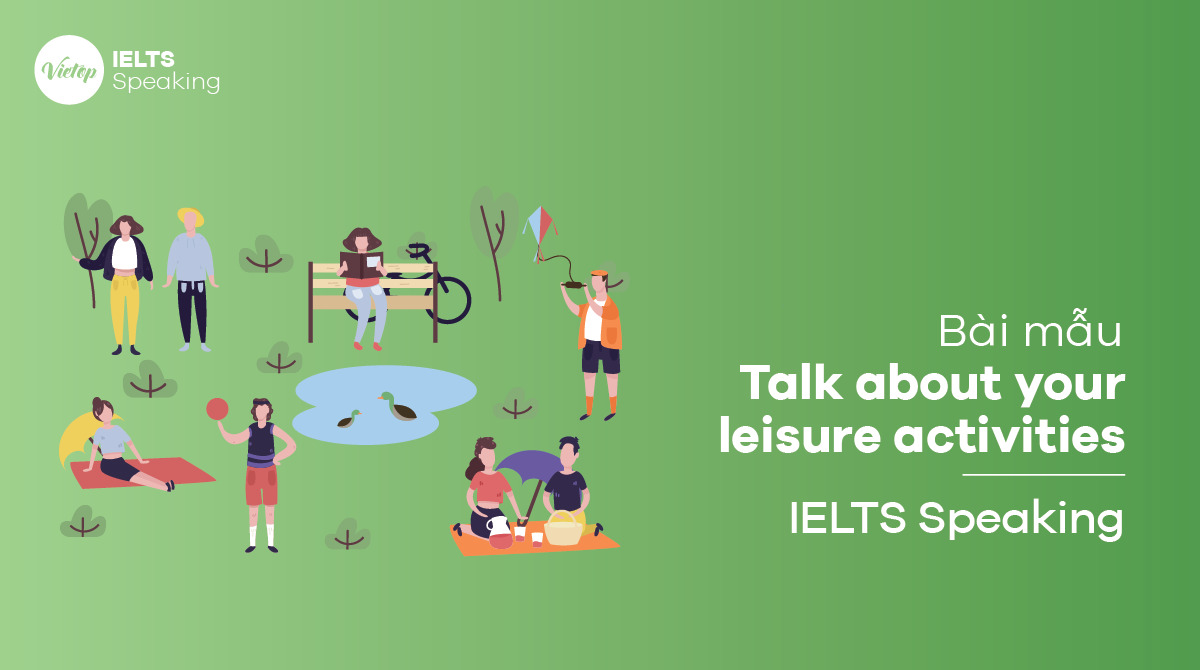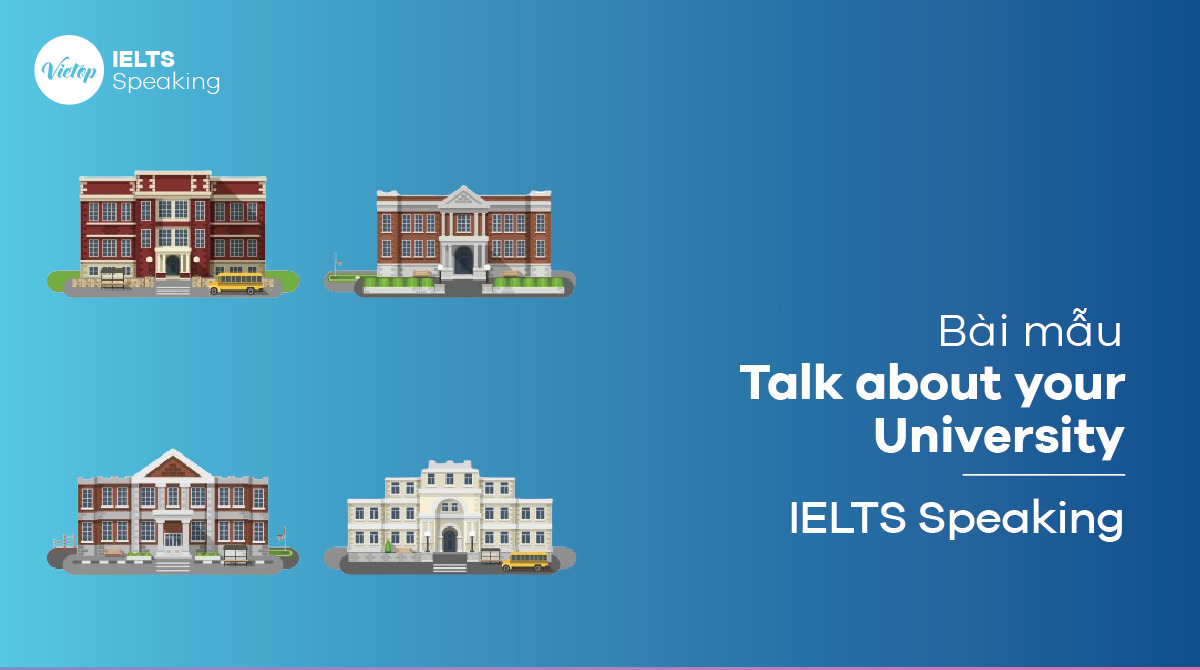Vietop gửi bạn bài mẫu giải đề Speaking 09/06/2022, cùng tìm hiểu và luyện tập IELTS Speaking thật tốt nhé!
![[ACE THE TEST] Giải đề Speaking 09/06/2022 1 giai de speaking 09 06 2022](https://www.ieltsvietop.vn/wp-content/uploads/2022/09/giai-de-speaking-09-06-2022.png)
IELTS Speaking Part 1: Museums
IELTS Speaking Part 1: Sample
1. Are there many museums in your hometown?
Yeah and off the top of my head, I can name a few museums in my hometown: War Remnant Museum, Museum of Traditional Vietnamese Medicine, and History Museum of Ho Chi Minh City. I’m sure there are more but I cannot recall their names right now.
- Off the top of my head: Ý nói là “ngay lúc này tôi nghĩ tới”.
- War Remnant Museum: Bảo Tàng Chứng Tích Chiến Tranh
- Museum of Traditional Vietnamese Medicine: Bảo Tàng Y Học Cổ Truyền Vietnam
- History Museum of Ho Chi Minh City: Bảo tàng Lịch sử Thành phố Hồ Chí Minh
- Recall (v): nhớ
2. Do you think museums are useful for visitors to your hometown?
Yes, visitors could learn a great deal about the culture and history of my hometown through exhibitions and artifacts.
- A great deal: Nhiều (có thể thay thế cho “a lot” trong trường hợp này)
- Exhibition (n): Triển lãm
- Artifact (v): Vật dụng, đồ tạo tác (ý chỉ vật được con người tạo ra, không có trong thiên nhiên)
3. Do you often visit a museum?
Unfortunately, no! I’m a college student so I’m drowned in coursework. It’s a shame though. I wish I had the time to come and check out some of the fantastic museums in my city.
- Be drowned in coursework: chìm trong bài vở (rất bận vì việc học)
- It’s a shame: đây là điều đáng tiếc
4. Do you think museums are important?
I’m inclined to say yes! They’re great places for people to learn about history and culture.
- Be inclined to do s.th: có xu hướng làm điều gì
Xem thêm
[ACE THE TEST] Giải đề Speaking 11/06/2022
Audio
IELTS Speaking Part 2
IELTS Speaking Part 2: Describe a useful skill you learned from an older person
![[ACE THE TEST] Giải đề Speaking 09/06/2022 2 Describe a useful skill you learned from an older person](https://www.ieltsvietop.vn/wp-content/uploads/2023/06/Describe-a-useful-skill-you-learned-from-an-older-person.png)
You should say:
- What it is
- Why the skill can be learned from older people
- How you learned the skill
And explain how you feel after mastering the skill
Sample
I’m going to talk about a craft skill which I have recently learnt from my uncle, and that is making book sleeves from discarded cereal boxes.
I’ve never been much of an artsy-craftsy person. However, I’ve always been really keen on reading books and recycling. I always want to keep my paperbacks in excellent condition so that I can reread them later. Being an environmentally conscious person, I don’t want to buy plastic sleeves for my books.
My uncle heard about my struggle, so he offered to teach me how to make my own book sleeves from the boxes of my breakfast cereal boxes. My uncle also loves reading books. But he grew up poor, so he didn’t have the luxury of buying accessories for his books and he had to learn how to make them himself. He told me to collect my used boxes, some glue, a paper knife, and highlighters to make the sleeves.
He first carefully took a box apart and turned it inside out to hide the design of the package. He then folded and glued it in a specific way into a book sleeve and then used the knife to cut the excess parts off. After that, he used the highlighters to decorate. Simultaneously, I followed him step-by-step.
My first product wasn’t beautiful and making it was harder than I thought. However, after a few tries with the guidance of my uncle, I successfully made a neat-looking book sleeve. Now, I make them for all my books, and I’ve even given some away. I’m so glad that my uncle was kind enough to teach me this very useful skill.
Xem ngay: Khóa học IELTS General – Thiết kế riêng cho đối tượng đang tìm kiếm cơ hội việc làm và định cư ở nước ngoài.
Voca
- Book sleeve: bìa bọc cho sách
- Paperback (n): sách bìa mỏng. Hardcover là sách bìa dày
- Environmentally conscious (adv adj): có ý thức về môi trường
- To have the luxury of + n/v-ing: có điều kiện làm việc gì đó
- Excess (adj): thừa/thuộc về phần thừa
- Simultaneously (adj): song song, cùng lúc đó (nói về các sự việc xảy ra cùng thời điểm)
- Step-by-step (adv): từng bước
Phân tích
→ Câu hỏi yêu cầu người trả lời miêu tả một kỹ năng có ích bạn học được từ một người lớn hơn bản thân (lưu ý không phải là học được từ người lớn tuổi, chỉ cần lớn hơn là đủ).
Bài trả lời nên có sự diễn tiến như sau: giới thiệu → lí do vì sao lại muốn học → miêu tả → cảm nhận. Trong phần miêu tả, có thể xem đây là một activity và tả theo trình tự các hành động (lưu ý sử dụng các liên từ về quy trình: first, next, then, after that…).
Không nhất thiết phải miêu tả quá cụ thể, có thể sử dụng cách nói chung chung như “do it in a specific/certain way to…” (làm theo một cách cụ thể). Nếu có ít ý về phần miêu tả, bạn hãy nói thêm về trong phần lí do và tập trung vào lợi ích mà kỹ năng này mang lại.
Audio
IELTS Speaking Part 2: Describe an interesting story you have heard
![[ACE THE TEST] Giải đề Speaking 09/06/2022 3 Describe an interesting story you have heard](https://www.ieltsvietop.vn/wp-content/uploads/2023/06/Describe-an-interesting-story-you-have-heard.png)
You should say:
- What it was?
- When you heard it?
- From whom/ where did you learn it?
And explain why you think it is interesting.
Sample
I am going to tell you about a folktale that my grandma told me a long time ago, and I was so interested in its horror that I still remember it after many years.
Before going to primary school, I lived with my grandma in a rural area. And frankly speaking, back then I was as stubborn as a mule, I never, ever wanted to go to bed early. Like almost any Vietnamese adult at that time, scaring their kids with horror stories of monsters or ghouls was the best way to force them to behave themselves.
So, my grandma, on a rainy and stormy night, told me the story of The Lantern Weasel – I vividly remember it was a giant weasel – you know, higher than an average child, with glowing eyes, sharp teeth, wears a Vietnamese palm-leaf conical hat and carries a traditional lantern. It only appears at night, by the bedroom’s window and will, like, capture the souls of children who misbehave into its lantern to devour them later. Needless to say, I was totally freaked out when hearing about that creepy creature.
However, when growing up, I actually found out that The Lantern Weasel was quite an interesting story and I still remember the lore because it was an unforgettable childhood memory for me, as I knew how frustrated my grandma was when having to deal with a stubborn kid like me at that time so she resorted to that mythical creature as the last solution to make me sleep. Till today, at night when I have to stay up late for studying, I somehow still have a spine-chilling feeling whenever I glance towards the window of my bedroom.
Voca
- Folktale (n): chuyện kể dân gian
- Frankly speaking: thật lòng mà nói
- As stubborn as a mule: cứng đầu cứng cổ (như một con la)
- Ghoul (n): ngạ quỷ
- Vividly (adv): một cách rõ rệt
- Weasel (n): con chồn
- Vietnamese palm-leaf conical hat (n): nón lá Việt Nam
- To capture (v): bắt giữ
- To misbehave (v): cư xử không đúng mực
- To devour (v): ngấu nghiến, cắn xé
- Needless to say: không cần phải nói
- Unforgettable (adj): khó quên
- Frustrated (adj): bực bội
- To resort (v): nhờ vào, trông cậy vào
- Mythical (adj): hoang đường, thần thoại, không có thật
- Spine-chilling feeling: cảm giác ớn lạnh xương sống
- To glance (v): liếc nhìn
Xem thêm:
Bài mẫu Topic Success – IELTS Speaking Part 2, 3
IELTS Speaking Part 3: Learning skills
IELTS Speaking part 3: Sample
1. What can children learn from their parents or grandparents?
There are many things a young child can learn from their older relatives. First and foremost, it is cooking. It is the most basic skill that is useful to virtually everyone. Another aspect of parental education that I believe is really important is personal finance. However, in my country, many parents avoid talking about money and how to manage money. I think this is a grave mistake as I’ve seen so many young people struggle with managing their budget once they move out from their home and live indecently. I’d like to see parents put more effort in educating their children about managing money.
- First and foremost: đầu tiên và quan trọng nhất (ý nói đây là ý quan trọng nhất)
- Virtually (adv): hầu hết
- Personal finance: tài chính cá nhân
- A grave mistake: một sai lầm tai hại
→ Câu hỏi yêu cầu người trả lời phải nêu ra và phân tích những kiến thức hay kỹ năng trẻ em có thể học được từ người lớn. Hãy liên hệ bản thân để có ý tưởng, có thể tập trung vào các kỹ năng hằng ngày như nấu nướng, giặt giũ, lái xe hoặc các kiến thức trừu tượng hơn như kỷ luật. Khai triển câu trả lời bằng cách phân tích tầm quan trọng của kỹ năng đó trong cuộc sống mỗi người.
2. From whom can children learn more, parents or grandparents?
Well, it depends on whoever they spend more time with. People often assume children naturally spend more time with their parents and thus they learn more from their mother and father. While this is true for many families, there is a growing trend, especially in metropolitan areas, that both the parents work fulltime and so they have to put the child in his or her grandparents’ care. In these cases, the child certainly learns more from the grandparents.
- Assume (v): mặc định
- Thus (adv): do vậy
- In these cases: trong những trường hợp này
→ Câu hỏi yêu cầu người trả lời đánh giá giữa hai lựa chọn. Người trả lời có thể chọn trẻ em học được nhiều hơn từ cha mẹ hoặc ông bà. Ở bất cứ trường hợp nào cần phải khai triển câu trả lời bằng cách giải thích, phân tích, cho ví dụ, … (tùy chọn vào cách trả lời). Trong trường hợp trả lời “it depends”, cần phải phân tích/giải thích thỏa đáng ở cả hai trường hợp.
3. What kind of help do you think older people need?
The elderly need a lot of help. Obviously, people who live to old age will eventually reach a point when they can’t physically take care of themselves. So, this task will fall on their children’s or grandchildren’s shoulders. If they live alone then they may need help from state-run nursing homes. However, I also want to stress the importance of giving the elderly psychological support, which is often overlooked. Loneliness and boredom are quite damaging to their health and their relatives need to talk to them, have dinner with them and take them on vacations.
- Reach a point: đến lúc
- Fall on someone’s shoulders: đặt trách nhiệm lên vai ai đó (hiểu là ai sẽ là người có trách nhiệm phải làm)
- State-run (adj): được vận hành bởi nhà nước
- Nursing home (n): viện dưỡng lão
- Stress (v): nhấn mạnh. Lưu ý stress (v) không phải là áp lực (stress (n))
- Be overlooked (bị động): bị bỏ qua
→ Câu hỏi yêu cầu người trả lời nêu ra và phân tích/miêu tả những gì người cao tuổi cần. Người trả lời nên liên hệ các thực trạng trong xã hội. Có thể liên hệ cá nhân nếu muốn.
Audio
Hy vọng qua bài mẫu giải đề Speaking 09/06/2022 có thể giúp bạn thực hành IELTS Speaking tốt và có thật nhiều từ vựng và ý tưởng hơn cho các chủ đề trên. Và nếu bạn có bất kỳ thắc mắc gì trong lúc luyện thi IELTS thì đừng ngàn ngại liên hệ với Vietop để được tư vấn nhé.










